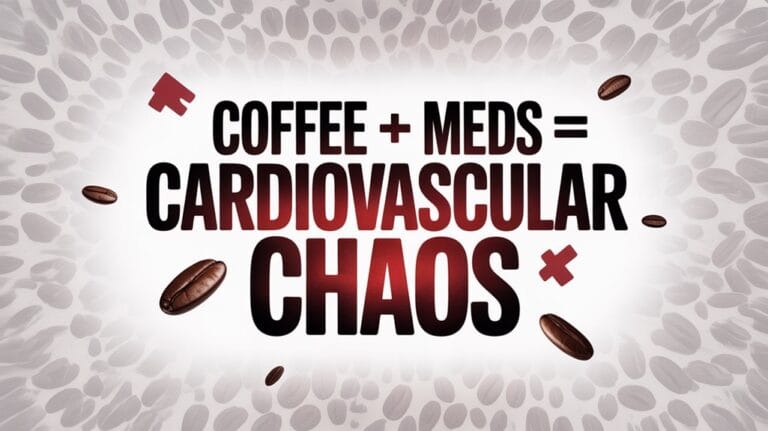Coffee and Medications Risk
While coffee is a daily ritual for many, mixing it with some medications can trigger dangerous reactions. Caffeine absorption impacts how well certain drugs work, such as antidepressants called MAOIs. These include phenelzine and selegiline. Combining them with coffee may spike blood pressure or heart rate, overwhelming the body’s ability to manage these effects.
Since MAOIs and caffeine both stimulate the nervous system, the pairing intensifies cardiovascular risks. Research shows the medication effectiveness drops if caffeine interferes, making strict avoidance vital for those prescribed these drugs.
Combining MAOIs with caffeine amplifies cardiovascular strain and lowers medication efficacy, necessitating strict caffeine avoidance for those prescribed these antidepressants.
Blood thinners like warfarin and aspirin can also clash with coffee. The drink slows blood clotting, raising the risk of bruising or serious bleeding if taken with anticoagulants. Patients on these medications are often advised to monitor their coffee intake and get regular blood tests to prevent complications.
Cold or allergy medicines add another layer of risk. Many contain stimulants like pseudoephedrine, which—when mixed with caffeine—can cause jitteriness, insomnia, or rapid heartbeats. Diabetics face extra danger: increased blood sugar and body temperature have been linked to combining these drugs with coffee. Some cold remedies already include caffeine, doubling the stimulant load.
Thyroid medications like levothyroxine face absorption issues if taken with coffee too soon. Drinking it within 30 minutes of a dose can slash drug efficacy, leading to poor symptom control. Patients are urged to wait at least an hour after taking thyroid pills before having coffee. Those prescribed lithium for bipolar disorder should also be cautious, as coffee increases lithium elimination, potentially reducing its effectiveness unless intake is carefully managed.
Patients on osteoporosis drugs like alendronate should exclusively take them with water, as coffee impairs absorption, leading to weaker treatment outcomes.
Asthma drugs such as theophylline share caffeine’s stimulant traits. Pairing them can amplify side effects like headaches, sleep disruption, or heart palpitations. Medical guidance is essential for those balancing respiratory treatments with caffeine consumption.
Sedatives and sleep aids aren’t spared. Caffeine can block their effects, making it harder to fall asleep or stay asleep. Even a morning coffee might linger in the system, counteracting nighttime sedatives taken hours later.
Though coffee seems harmless, its interactions with medications are far from trivial. Patients are encouraged to discuss their caffeine habits with doctors to avoid unintended health risks. Clear communication and timing adjustments often minimize dangers, but oversight can lead to serious consequences.

